
airbnb-clone
A Full Stack Airbnb Clone built with Next js
Stars: 65
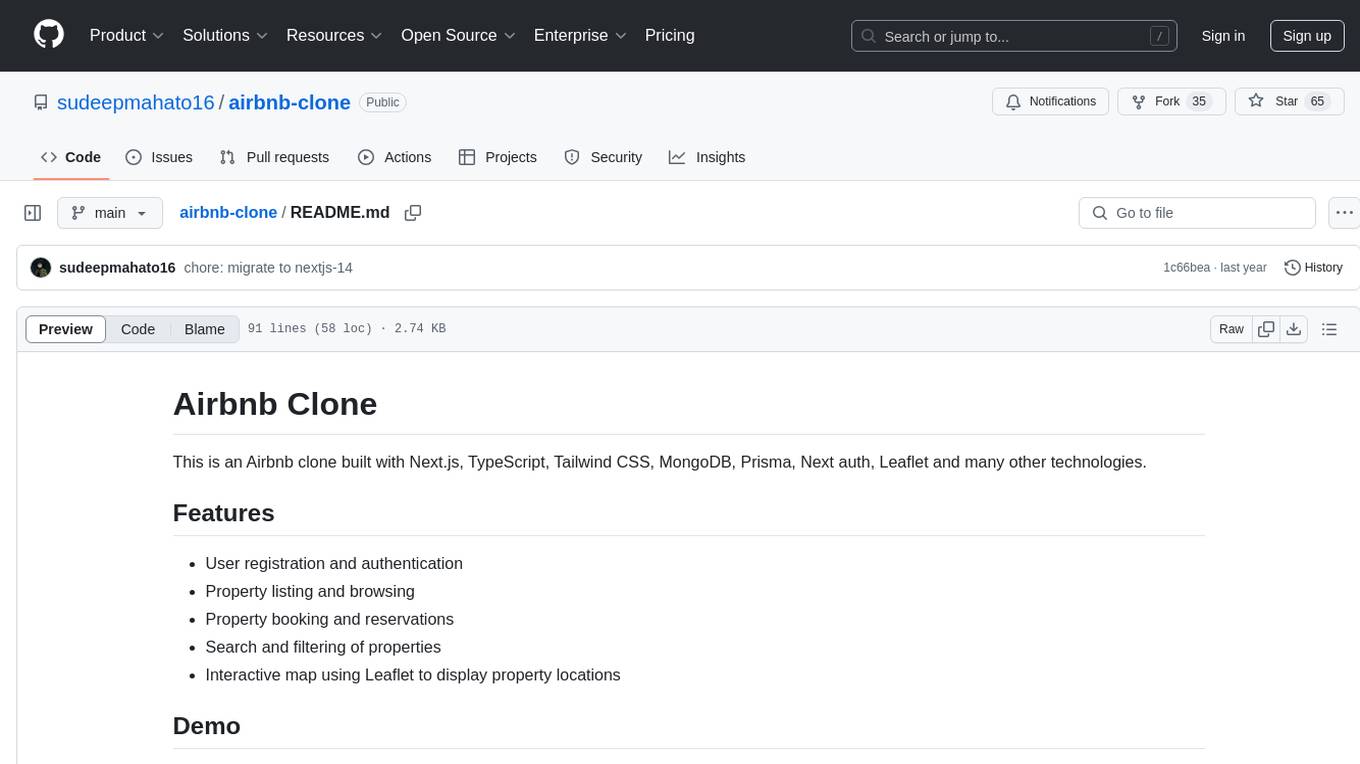
This Airbnb clone project is a web application built with Next.js, TypeScript, Tailwind CSS, MongoDB, Prisma, Next auth, and Leaflet. It allows users to register, list and browse properties, make bookings and reservations, search and filter properties, and view property locations on an interactive map.
README:
This is an Airbnb clone built with Next.js, TypeScript, Tailwind CSS, MongoDB, Prisma, Next auth, Leaflet and many other technologies.
- User registration and authentication
- Property listing and browsing
- Property booking and reservations
- Search and filtering of properties
- Interactive map using Leaflet to display property locations
You can check out a live demo of the Airbnb clone project here.
Make sure you have the following software installed on your system:
-
git If you want to clone the project from GitHub and work with it locally, you will need to have Git installed on your system. You can download and install Git from the official website (https://git-scm.com/).
-
Node.js Application requires Node.js to be installed on your system in order to run. You can download and install the latest version of Node.js from the official website (https://nodejs.org/).
-
Clone the repository:
git clone https://github.com/sudeepmahato16/airbnb_clone.git -
Navigate to the project directory:
cd Airbnb -
Install the dependencies:
npm install -
Set up the environment variables:
-
Create a
.env.localfile in the root directory. -
Add the following variables to the .env file, replacing the placeholder values with your own:
DATABASE_URL=<your-mongodb-uri> GITHUB_CLIENT_ID=<your-github-client-id> GITHUB_CLIENT_SECRET=<your-github-client-secret> GOOGLE_CLIENT_ID=<your-google-client-id> GOOGLE_CLIENT_SECRET=<your-google-client-secret> NEXTAUTH_SECRET=<your-nextauth-secret> EDGE_STORE_ACCESS_KEY=<your-edge-store-access-key> EDGE_STORE_SECRET_KEY=<your-edge-store-secret-key>
-
-
Start the development server:
npm run dev -
Open your browser and visit
http://localhost:3000to access the application.
Contributions are welcome! If you want to contribute to this project, please follow these steps:
- Fork the repository.
- Create a new branch for your feature or bug fix.
- Commit your changes to the new branch.
- Open a pull request back to the main repository, including a description of your changes.
For Tasks:
Click tags to check more tools for each tasksFor Jobs:
Alternative AI tools for airbnb-clone
Similar Open Source Tools

airbnb-clone
This Airbnb clone project is a web application built with Next.js, TypeScript, Tailwind CSS, MongoDB, Prisma, Next auth, and Leaflet. It allows users to register, list and browse properties, make bookings and reservations, search and filter properties, and view property locations on an interactive map.
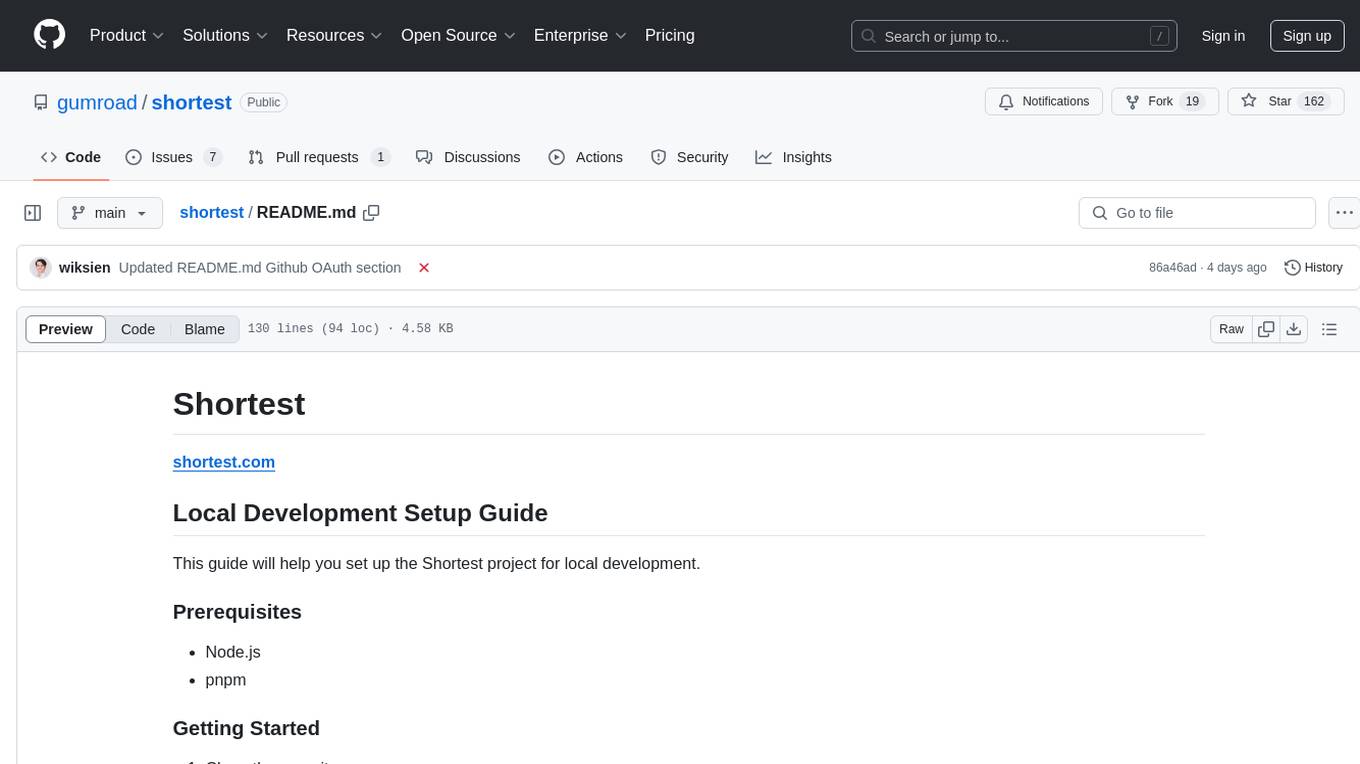
shortest
Shortest is a project for local development that helps set up environment variables and services for a web application. It provides a guide for setting up Node.js and pnpm dependencies, configuring services like Clerk, Vercel Postgres, Anthropic, Stripe, and GitHub OAuth, and running the application and tests locally.
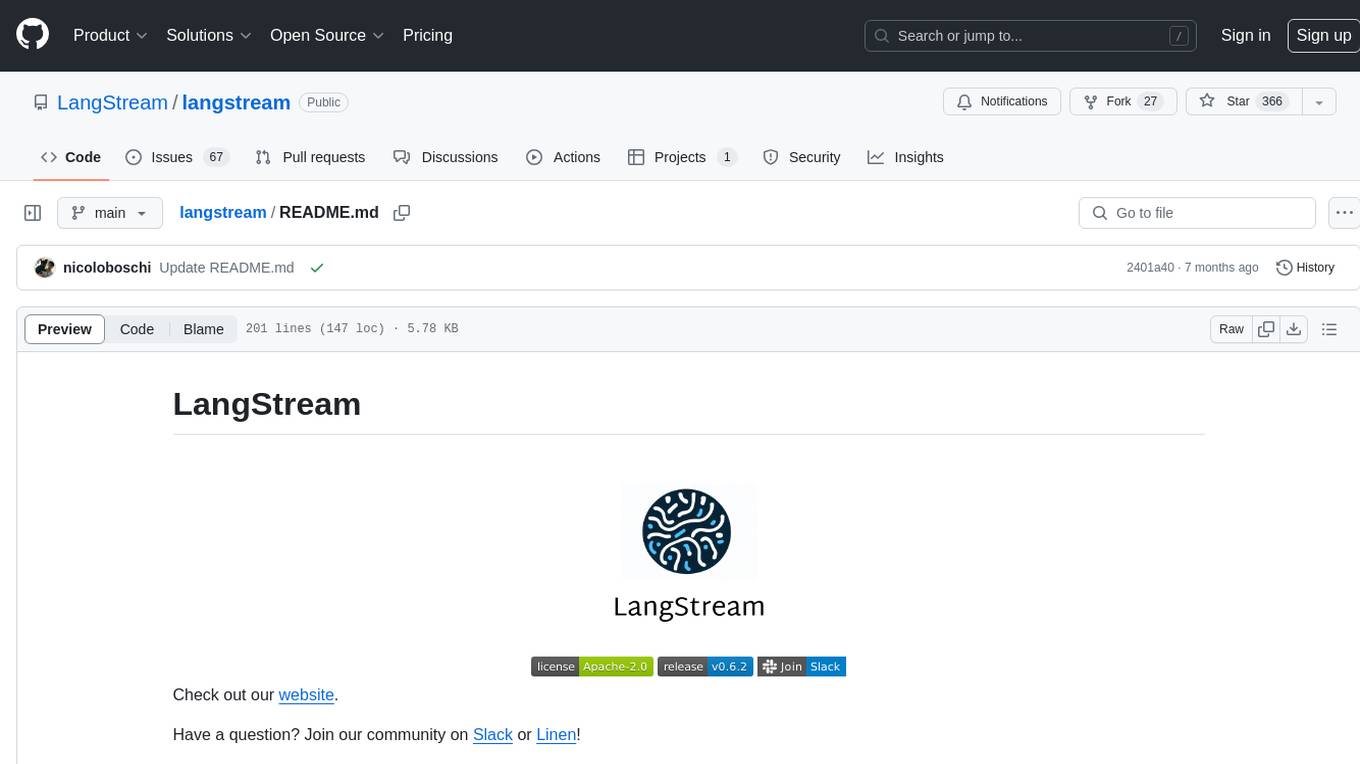
langstream
LangStream is a tool for natural language processing tasks, providing a CLI for easy installation and usage. Users can try sample applications like Chat Completions and create their own applications using the developer documentation. It supports running on Kubernetes for production-ready deployment, with support for various Kubernetes distributions and external components like Apache Kafka or Apache Pulsar cluster. Users can deploy LangStream locally using minikube and manage the cluster with mini-langstream. Development requirements include Docker, Java 17, Git, Python 3.11+, and PIP, with the option to test local code changes using mini-langstream.
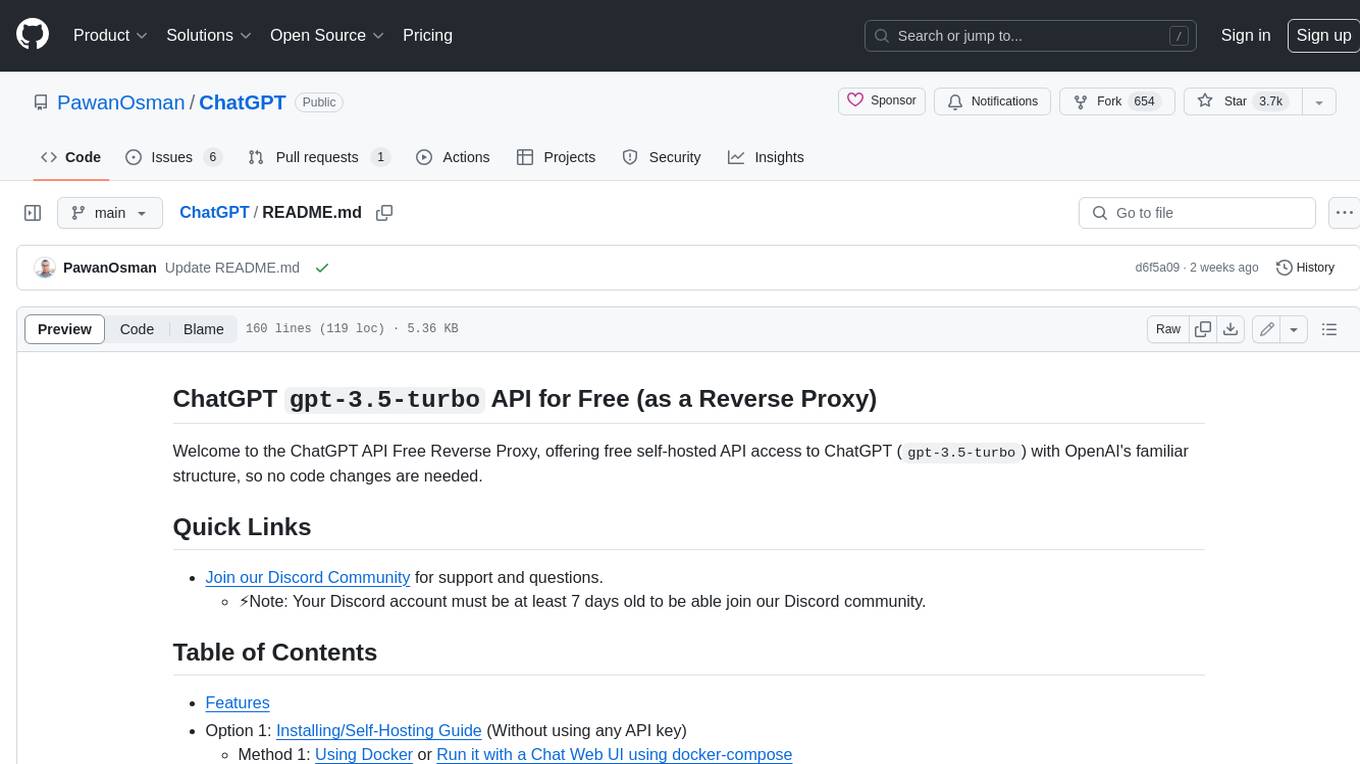
ChatGPT
The ChatGPT API Free Reverse Proxy provides free self-hosted API access to ChatGPT (`gpt-3.5-turbo`) with OpenAI's familiar structure, eliminating the need for code changes. It offers streaming response, API endpoint compatibility, and complimentary access without an API key. Installation options include Docker, PC/Server, and Termux on Android devices. The API can be accessed through a self-hosted local server or a pre-hosted API with an API key obtained from the Discord server. Usage examples are provided for Python and Node.js, and the project is licensed under AGPL-3.0.
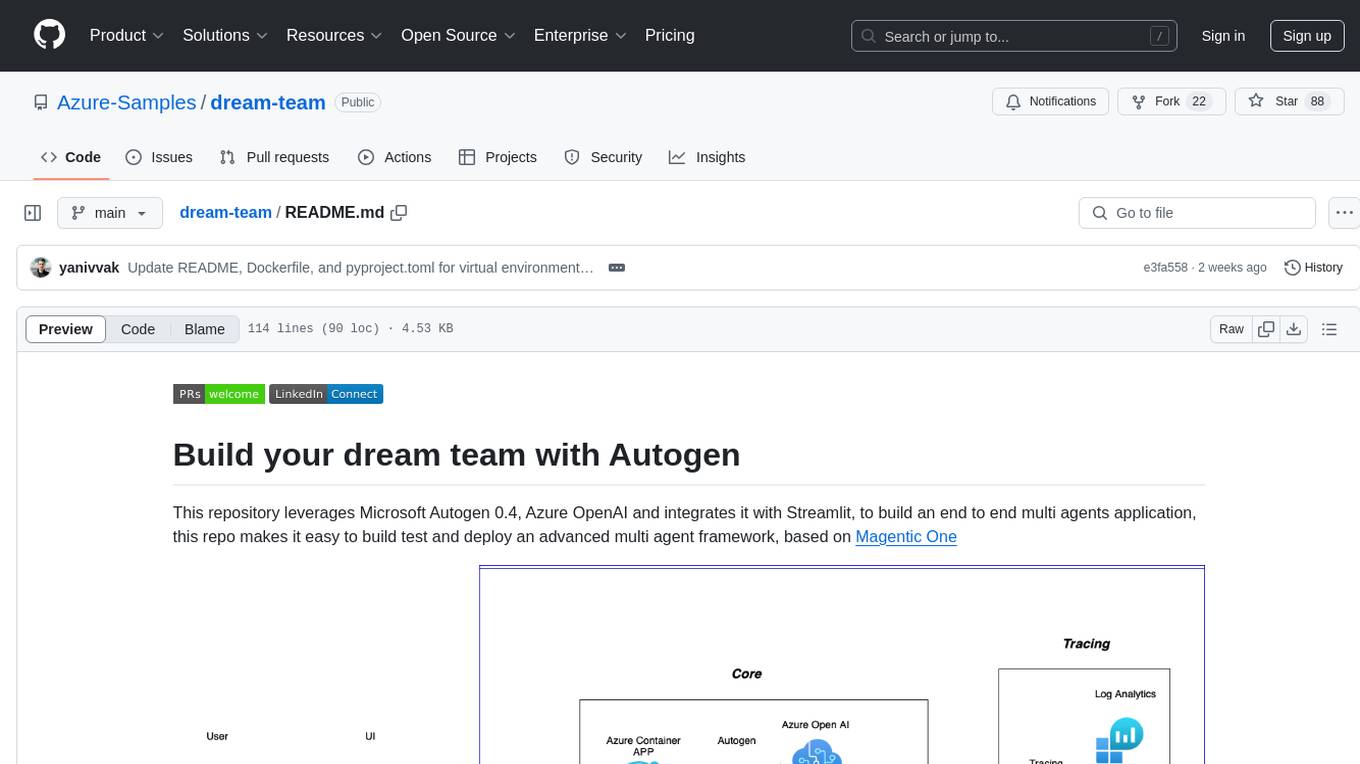
dream-team
Build your dream team with Autogen is a repository that leverages Microsoft Autogen 0.4, Azure OpenAI, and Streamlit to create an end-to-end multi-agent application. It provides an advanced multi-agent framework based on Magentic One, with features such as a friendly UI, single-line deployment, secure code execution, managed identities, and observability & debugging tools. Users can deploy Azure resources and the app with simple commands, work locally with virtual environments, install dependencies, update configurations, and run the application. The repository also offers resources for learning more about building applications with Autogen.
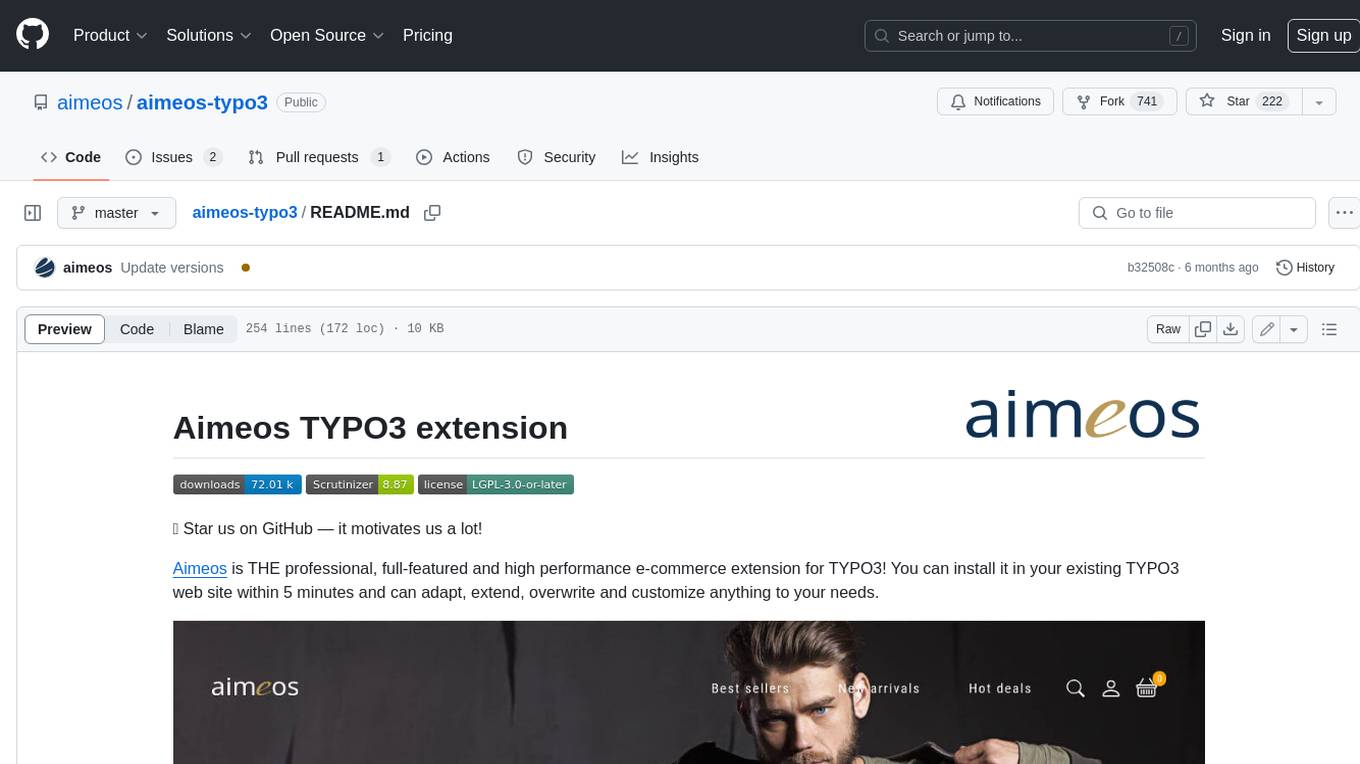
aimeos-typo3
Aimeos is a professional, full-featured, and high-performance e-commerce extension for TYPO3. It can be installed in an existing TYPO3 website within 5 minutes and can be adapted, extended, overwritten, and customized to meet specific needs.

gitingest
GitIngest is a tool that allows users to turn any Git repository into a prompt-friendly text ingest for LLMs. It provides easy code context by generating a text digest from a git repository URL or directory. The tool offers smart formatting for optimized output format for LLM prompts and provides statistics about file and directory structure, size of the extract, and token count. GitIngest can be used as a CLI tool on Linux and as a Python package for code integration. The tool is built using Tailwind CSS for frontend, FastAPI for backend framework, tiktoken for token estimation, and apianalytics.dev for simple analytics. Users can self-host GitIngest by building the Docker image and running the container. Contributions to the project are welcome, and the tool aims to be beginner-friendly for first-time contributors with a simple Python and HTML codebase.
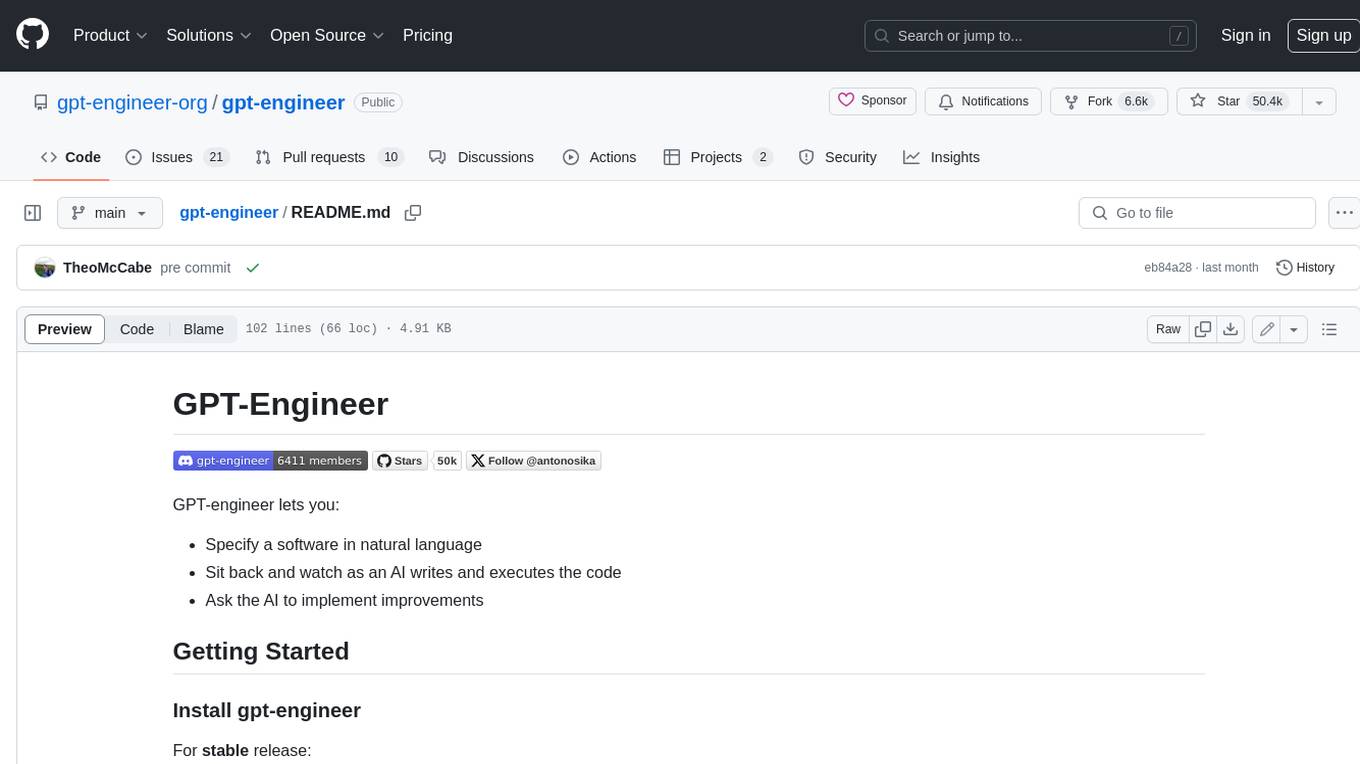
gpt-engineer
GPT-Engineer is a tool that allows you to specify a software in natural language, sit back and watch as an AI writes and executes the code, and ask the AI to implement improvements.
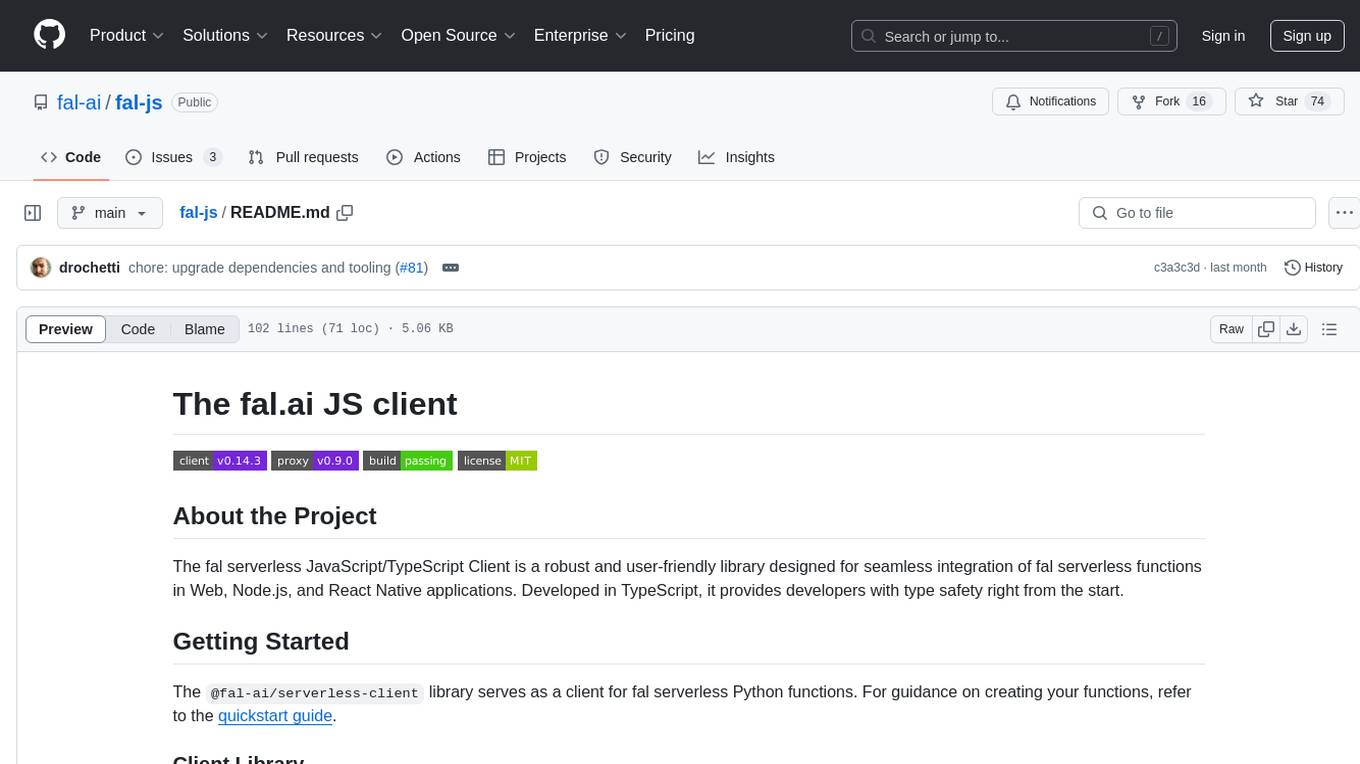
fal-js
The fal.ai JS client is a robust and user-friendly library for seamless integration of fal serverless functions in Web, Node.js, and React Native applications. Developed in TypeScript, it provides developers with type safety right from the start. The client library is crafted as a lightweight layer atop platform standards like `fetch`, ensuring hassle-free integration into existing codebases and flawless operation across various JavaScript runtimes. The client proxy feature allows secure handling of credentials by using a server proxy for serverless APIs. The repository also includes example Next.js applications for demonstration and integration.
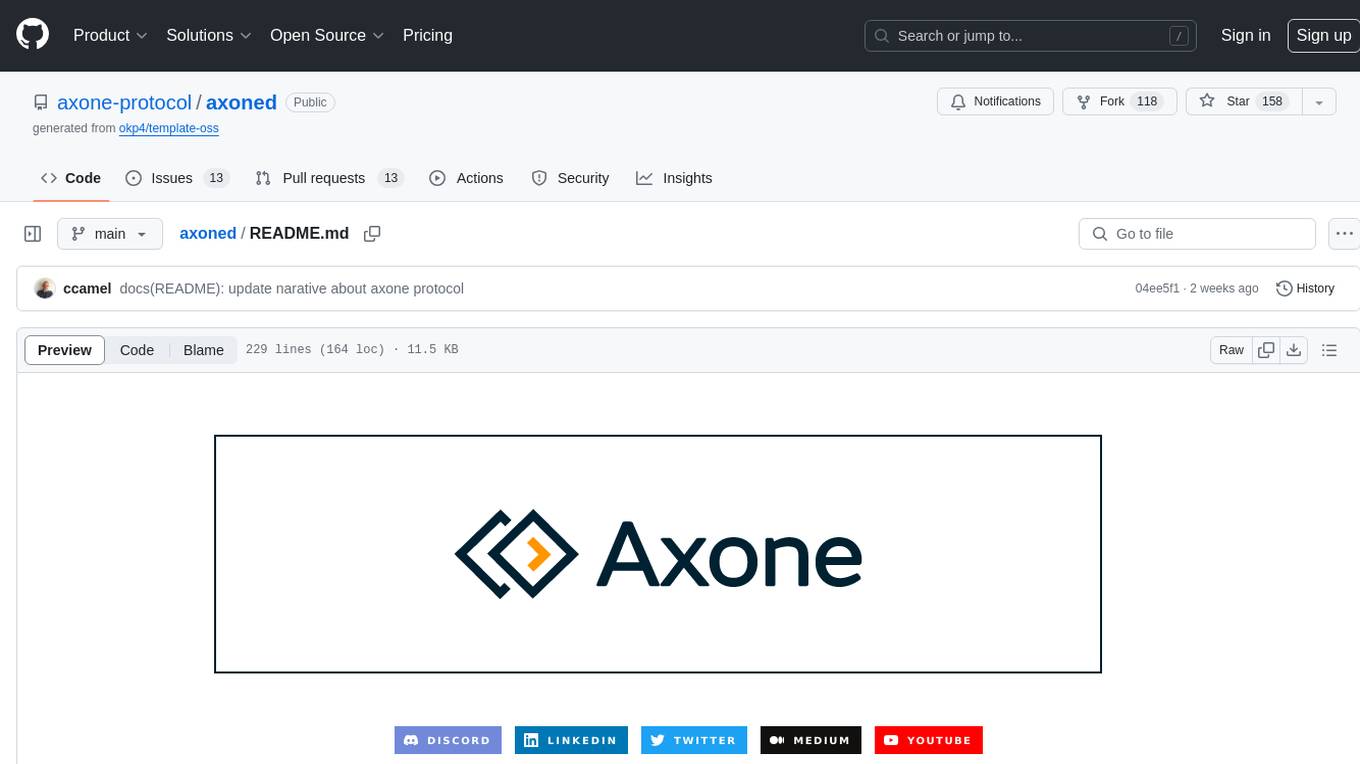
axoned
Axone is a public dPoS layer 1 designed for connecting, sharing, and monetizing resources in the AI stack. It is an open network for collaborative AI workflow management compatible with any data, model, or infrastructure, allowing sharing of data, algorithms, storage, compute, APIs, both on-chain and off-chain. The 'axoned' node of the AXONE network is built on Cosmos SDK & Tendermint consensus, enabling companies & individuals to define on-chain rules, share off-chain resources, and create new applications. Validators secure the network by maintaining uptime and staking $AXONE for rewards. The blockchain supports various platforms and follows Semantic Versioning 2.0.0. A docker image is available for quick start, with documentation on querying networks, creating wallets, starting nodes, and joining networks. Development involves Go and Cosmos SDK, with smart contracts deployed on the AXONE blockchain. The project provides a Makefile for building, installing, linting, and testing. Community involvement is encouraged through Discord, open issues, and pull requests.
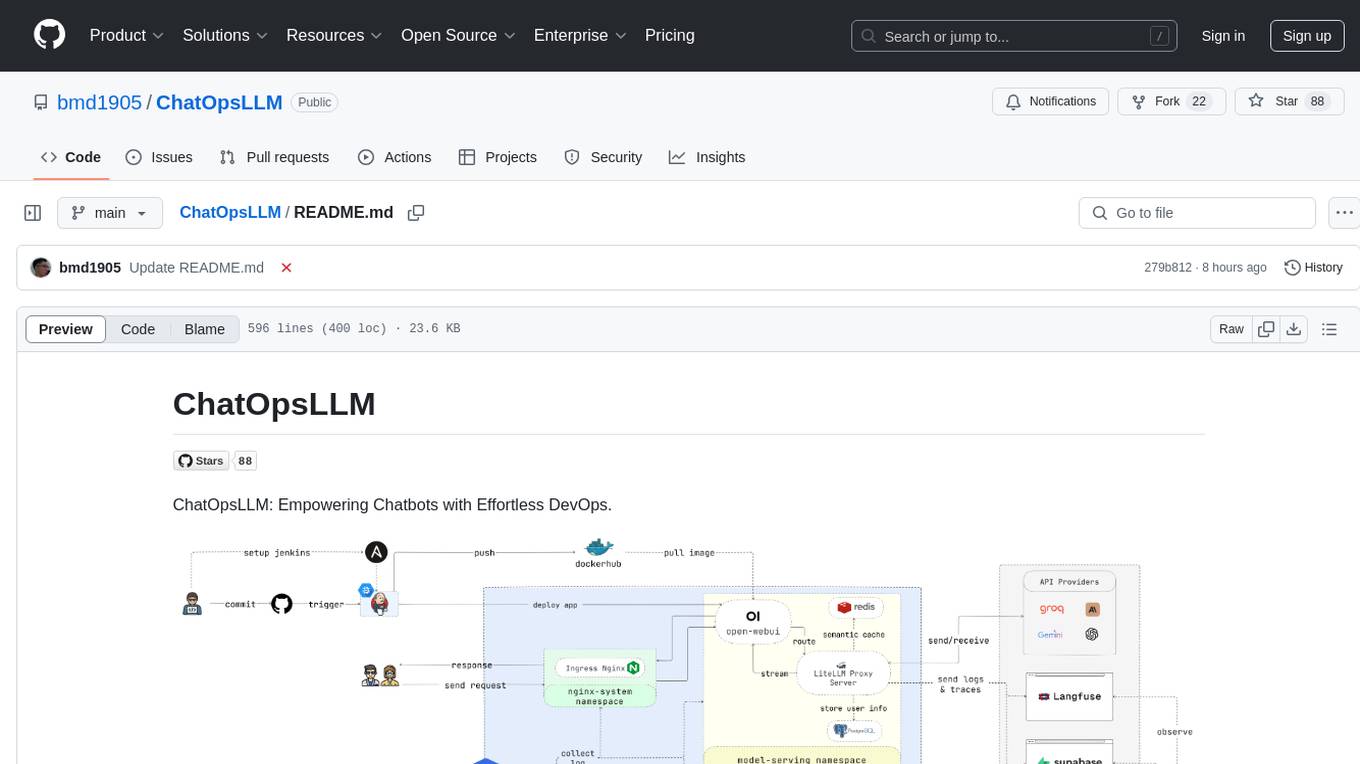
ChatOpsLLM
ChatOpsLLM is a project designed to empower chatbots with effortless DevOps capabilities. It provides an intuitive interface and streamlined workflows for managing and scaling language models. The project incorporates robust MLOps practices, including CI/CD pipelines with Jenkins and Ansible, monitoring with Prometheus and Grafana, and centralized logging with the ELK stack. Developers can find detailed documentation and instructions on the project's website.
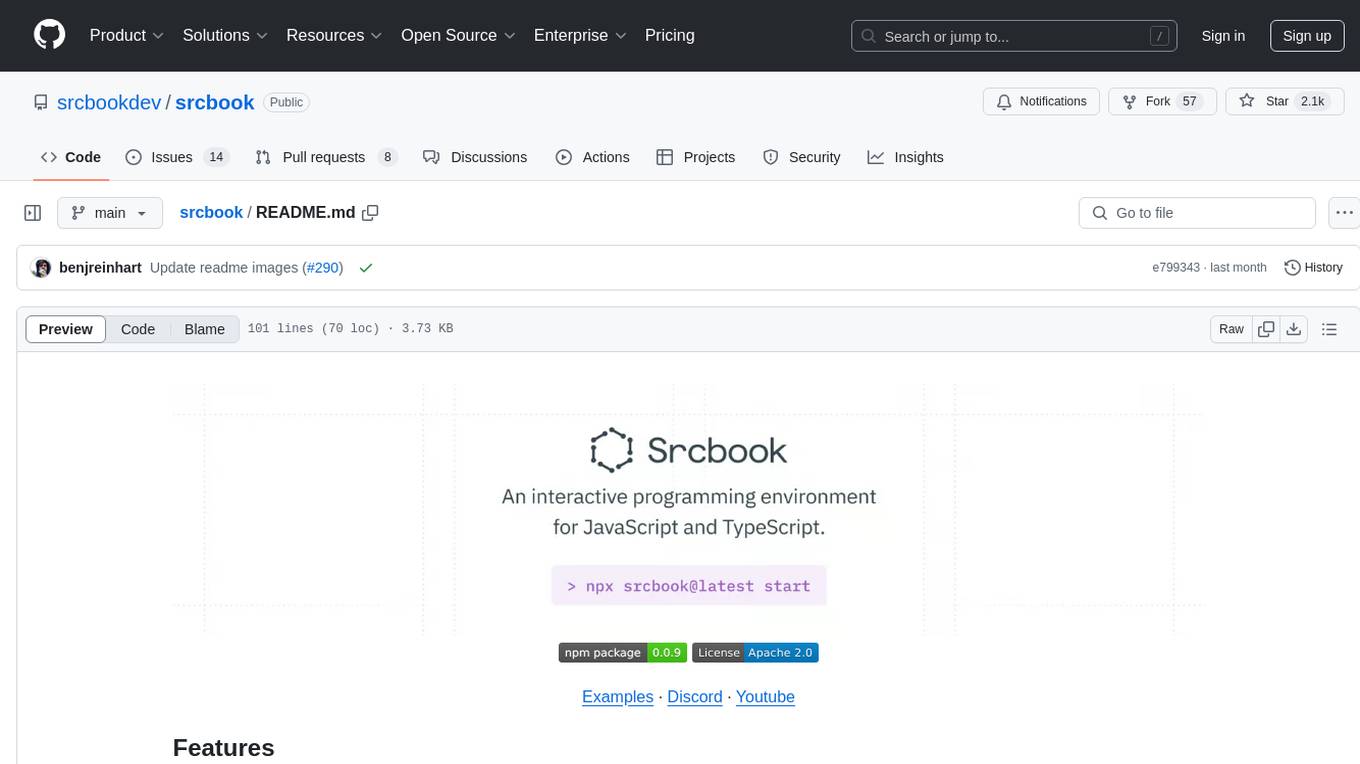
srcbook
Srcbook is an open-source interactive programming environment for TypeScript that allows users to create, run, and share reproducible programs and ideas. It features AI capabilities for exploring and iterating on ideas, supports exporting to valid markdown format, and enables diagraming with mermaid for rich annotations. Users can locally execute programs through a web interface, powered by Node.js under the Apache2 license.

botpress
Botpress is a platform for building next-generation chatbots and assistants powered by OpenAI. It provides a range of tools and integrations to help developers quickly and easily create and deploy chatbots for various use cases.
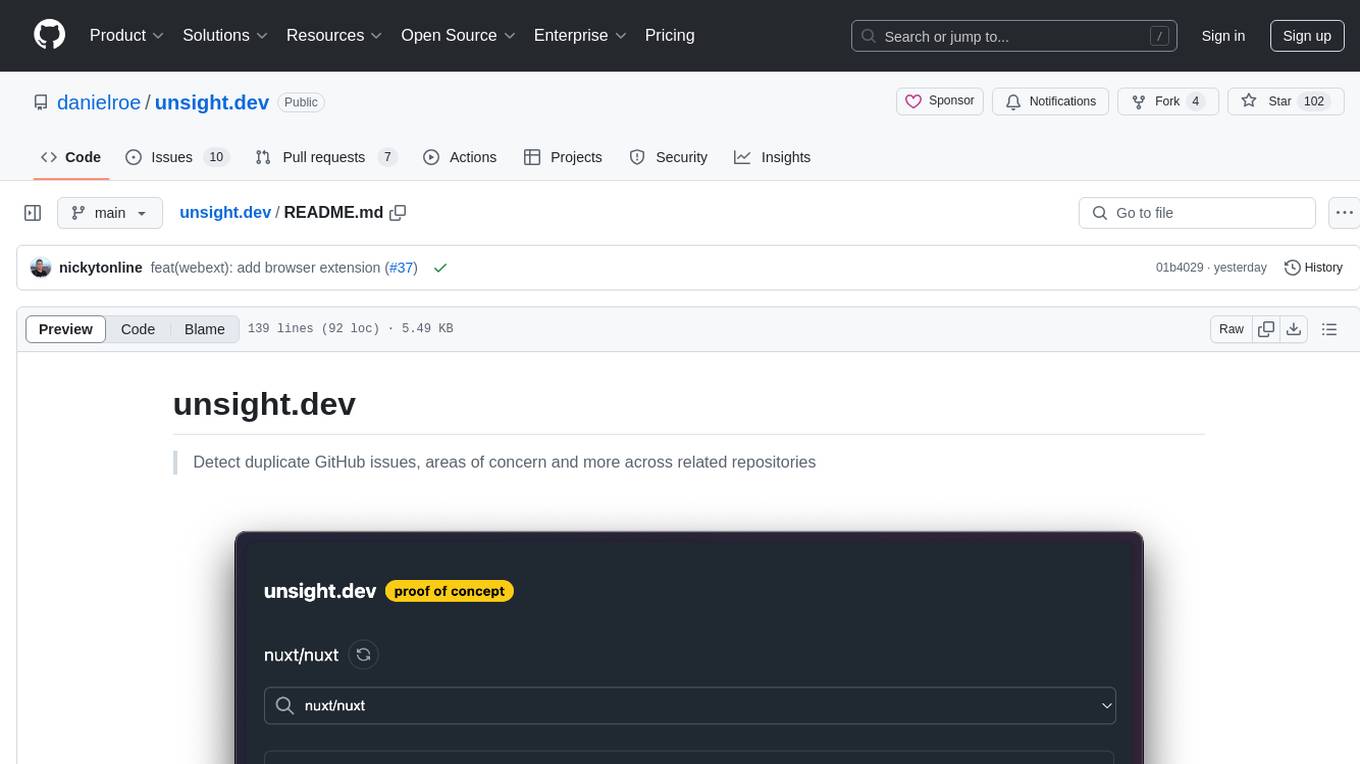
unsight.dev
unsight.dev is a tool built on Nuxt that helps detect duplicate GitHub issues and areas of concern across related repositories. It utilizes Nitro server API routes, GitHub API, and a GitHub App, along with UnoCSS. The tool is deployed on Cloudflare with NuxtHub, using Workers AI, Workers KV, and Vectorize. It also offers a browser extension soon to be released. Users can try the app locally for tweaking the UI and setting up a full development environment as a GitHub App.
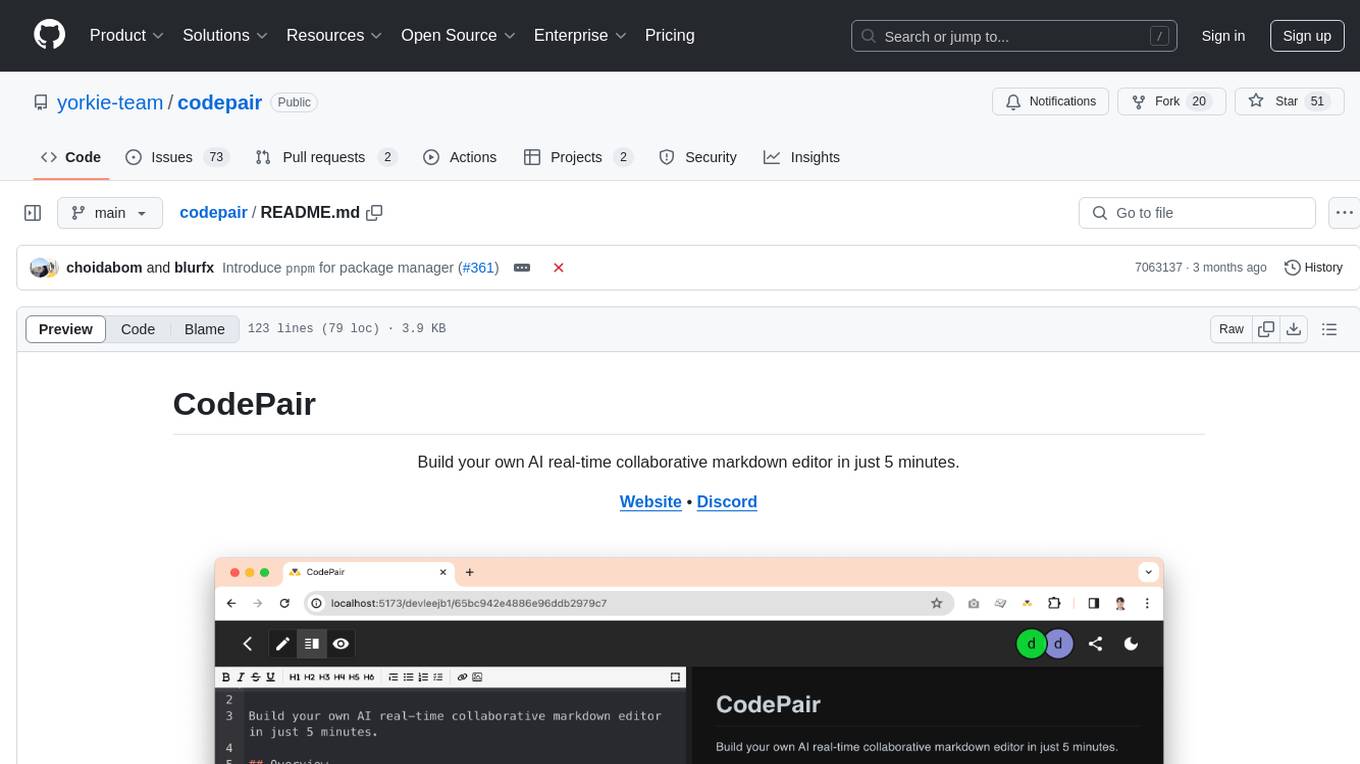
codepair
CodePair is an open-source real-time collaborative markdown editor with AI intelligence, allowing users to collaboratively edit documents, share documents with external parties, and utilize AI intelligence within the editor. It is built using React, NestJS, and LangChain. The repository contains frontend and backend code, with detailed instructions for setting up and running each part. Users can choose between Frontend Development Only Mode or Full Stack Development Mode based on their needs. CodePair also integrates GitHub OAuth for Social Login feature. Contributors are welcome to submit patches and follow the contribution workflow.
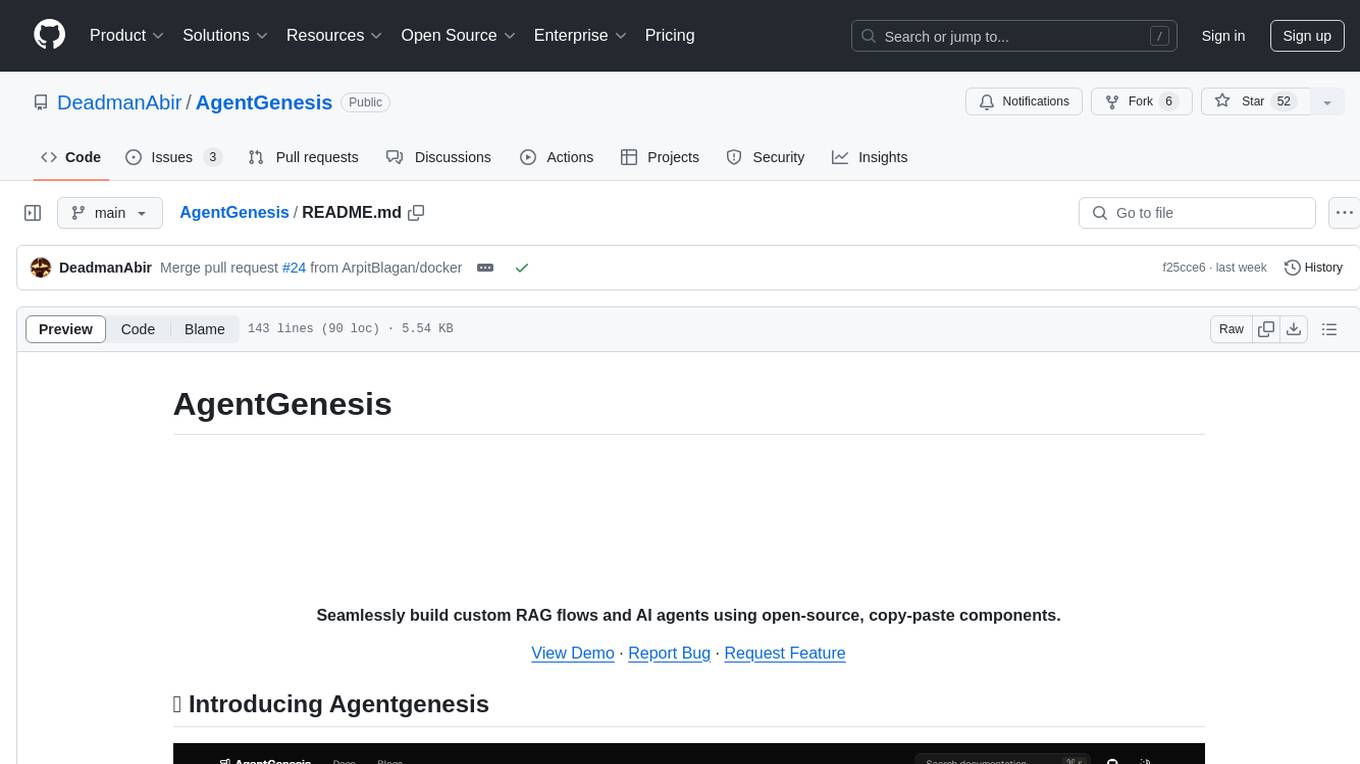
AgentGenesis
AgentGenesis is an open-source web app that provides customizable Gen AI code snippets for building custom RAG flows and AI agents. Users can easily copy and paste components into their applications, modify the code as needed, and build on top of it. The tool aims to simplify the development process by offering pre-built code snippets that can be integrated seamlessly into projects without the need for npm installation. AgentGenesis encourages contributions, positive feedback, and support from the community to enhance and grow the project.
For similar tasks

airbnb-clone
This Airbnb clone project is a web application built with Next.js, TypeScript, Tailwind CSS, MongoDB, Prisma, Next auth, and Leaflet. It allows users to register, list and browse properties, make bookings and reservations, search and filter properties, and view property locations on an interactive map.
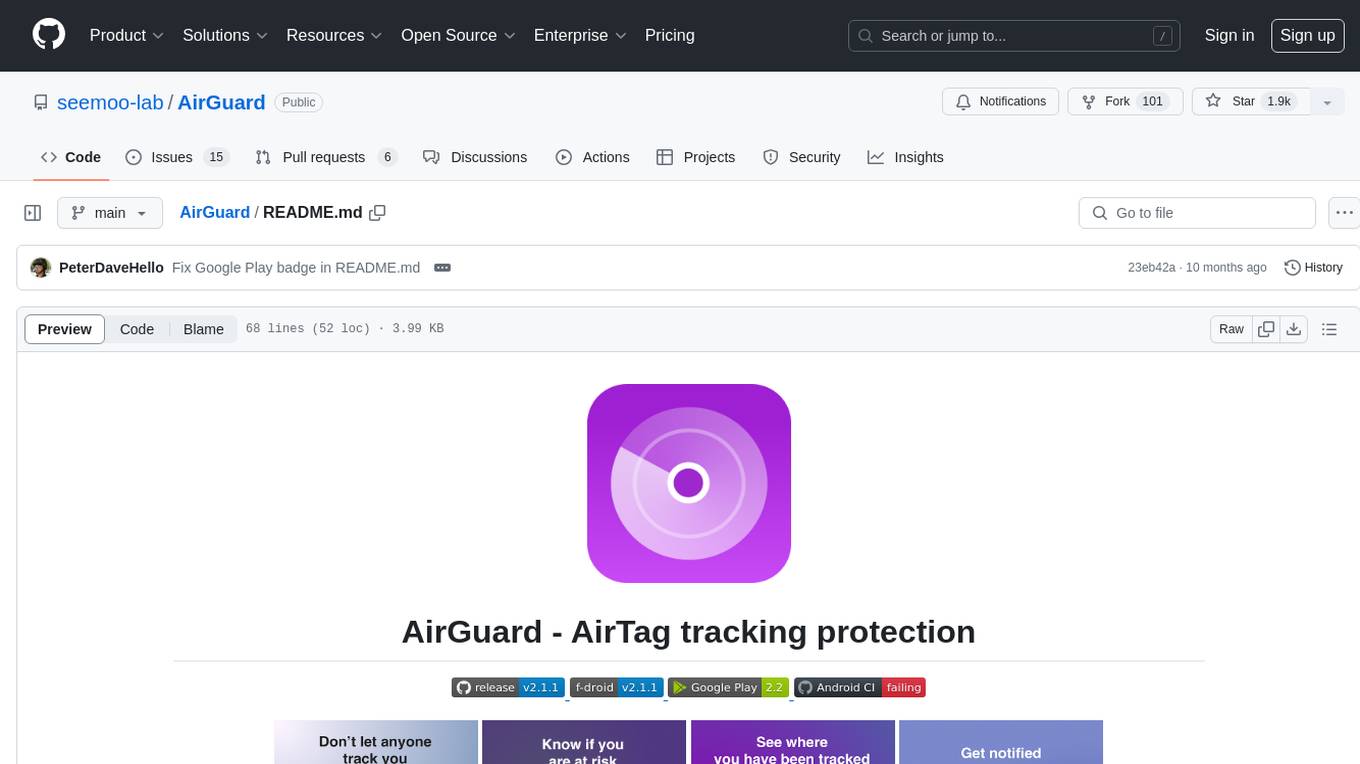
AirGuard
AirGuard is an anti-tracking protection app designed to protect Android users from being tracked by AirTags and other Find My devices. The app periodically scans the surroundings for potential tracking devices and notifies the user if being followed. Users can play a sound on AirTags, view tracked locations, and participate in a research study on privacy protection. AirGuard does not monetize through ads or in-app purchases and ensures all tracking detection and notifications happen locally on the user's device.
For similar jobs
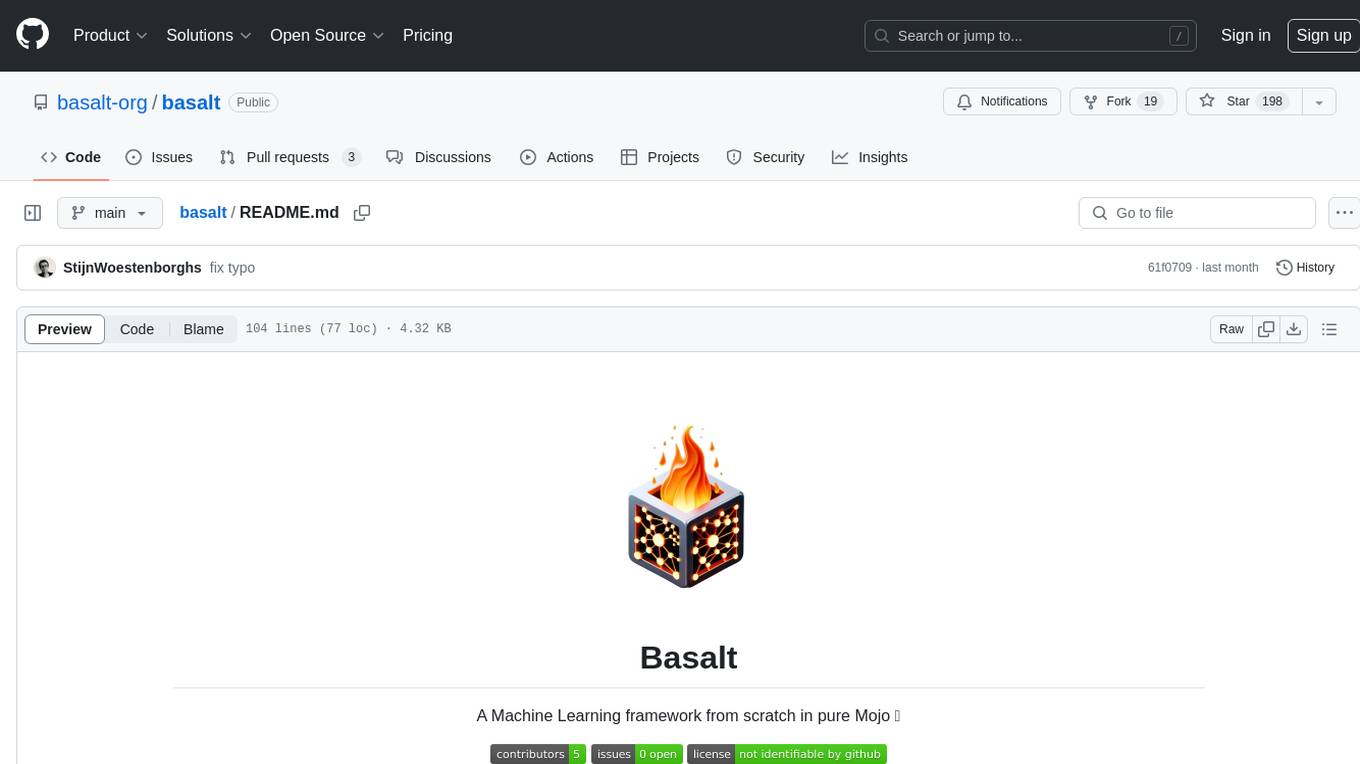
basalt
Basalt is a lightweight and flexible CSS framework designed to help developers quickly build responsive and modern websites. It provides a set of pre-designed components and utilities that can be easily customized to create unique and visually appealing web interfaces. With Basalt, developers can save time and effort by leveraging its modular structure and responsive design principles to create professional-looking websites with ease.
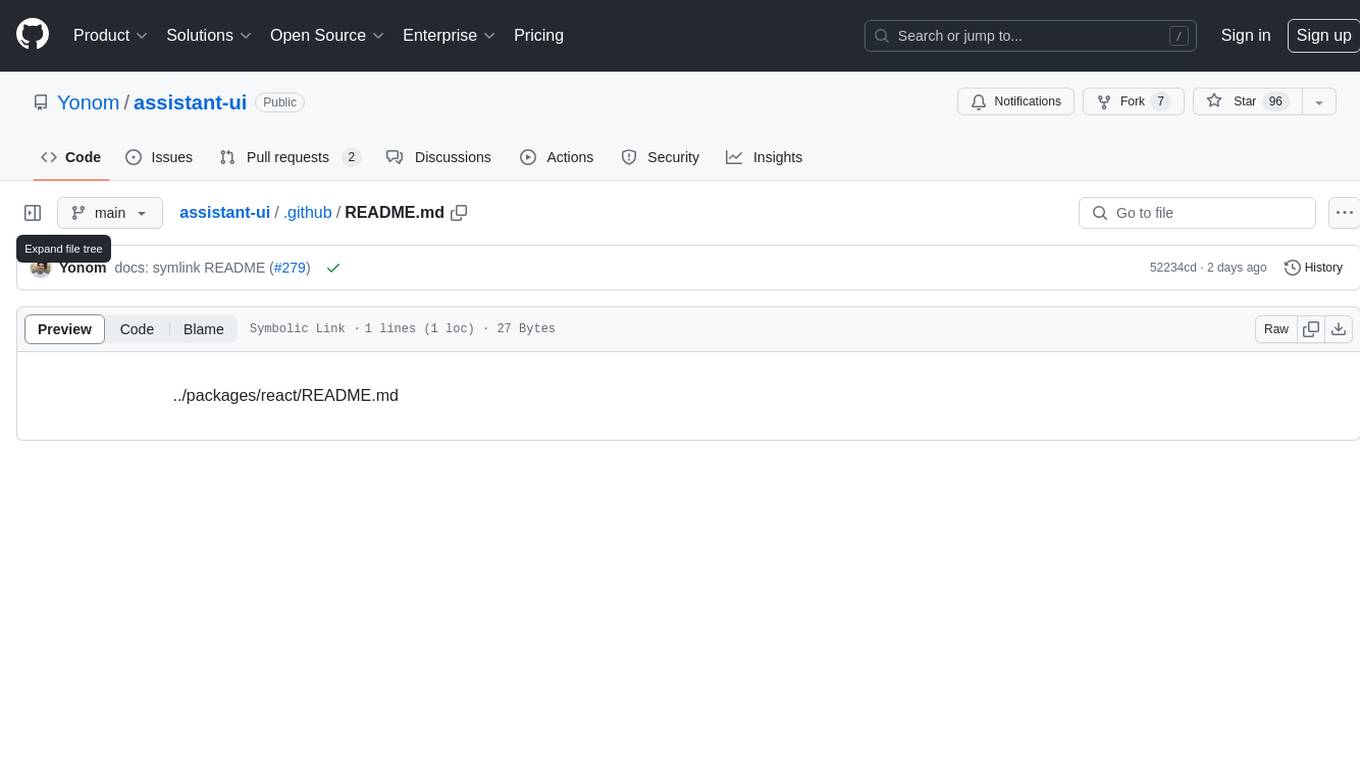
assistant-ui
assistant-ui is a set of React components for AI chat. It provides a collection of components that can be easily integrated into projects to create AI chat interfaces for Discord, websites, and demos. The components are designed to streamline the process of setting up AI chat functionality in React applications, making it easier for developers to incorporate AI chat features into their projects.
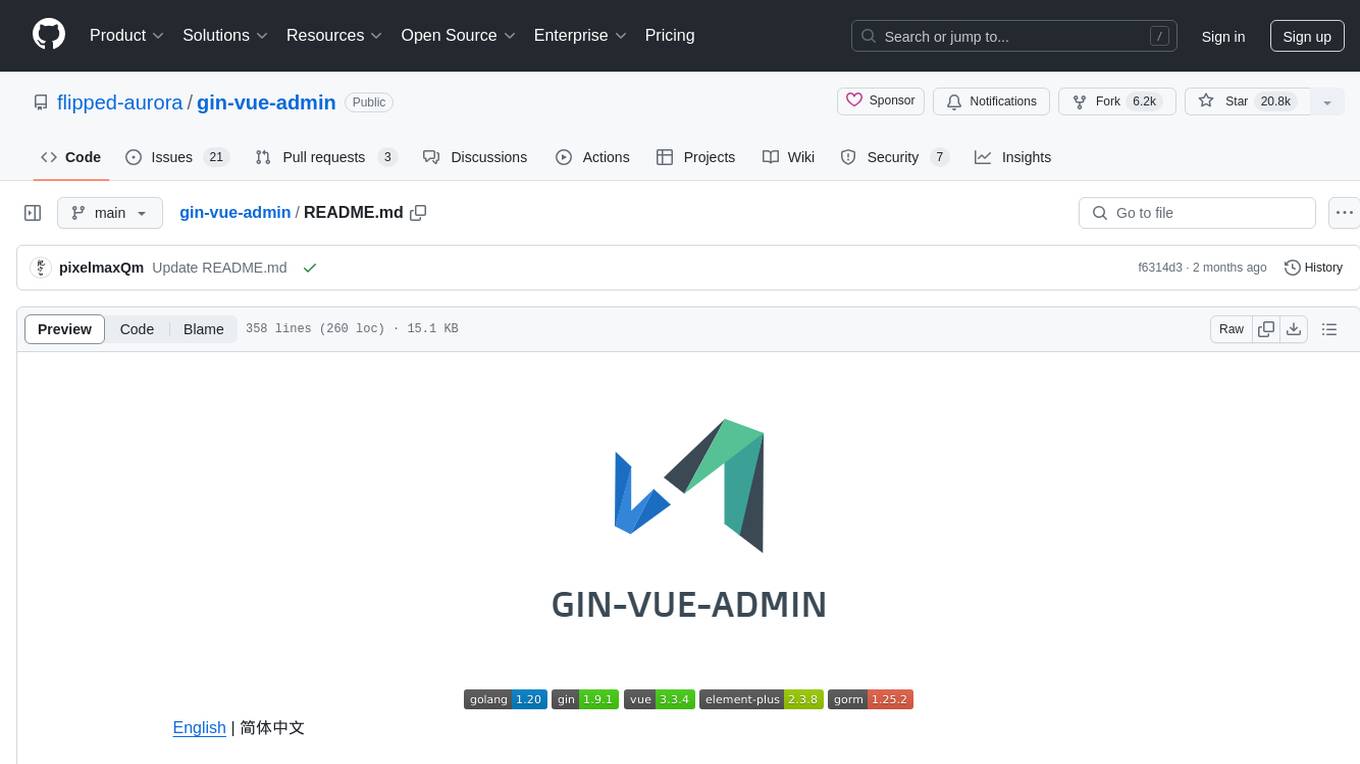
gin-vue-admin
Gin-vue-admin is a full-stack development platform based on Vue and Gin, integrating features like JWT authentication, dynamic routing, dynamic menus, Casbin authorization, form generator, code generator, etc. It provides various example files to help users focus more on business development. The project offers detailed documentation, video tutorials for setup and deployment, and a community for support and contributions. Users need a certain level of knowledge in Golang and Vue to work with this project. It is recommended to follow the Apache2.0 license if using the project for commercial purposes.
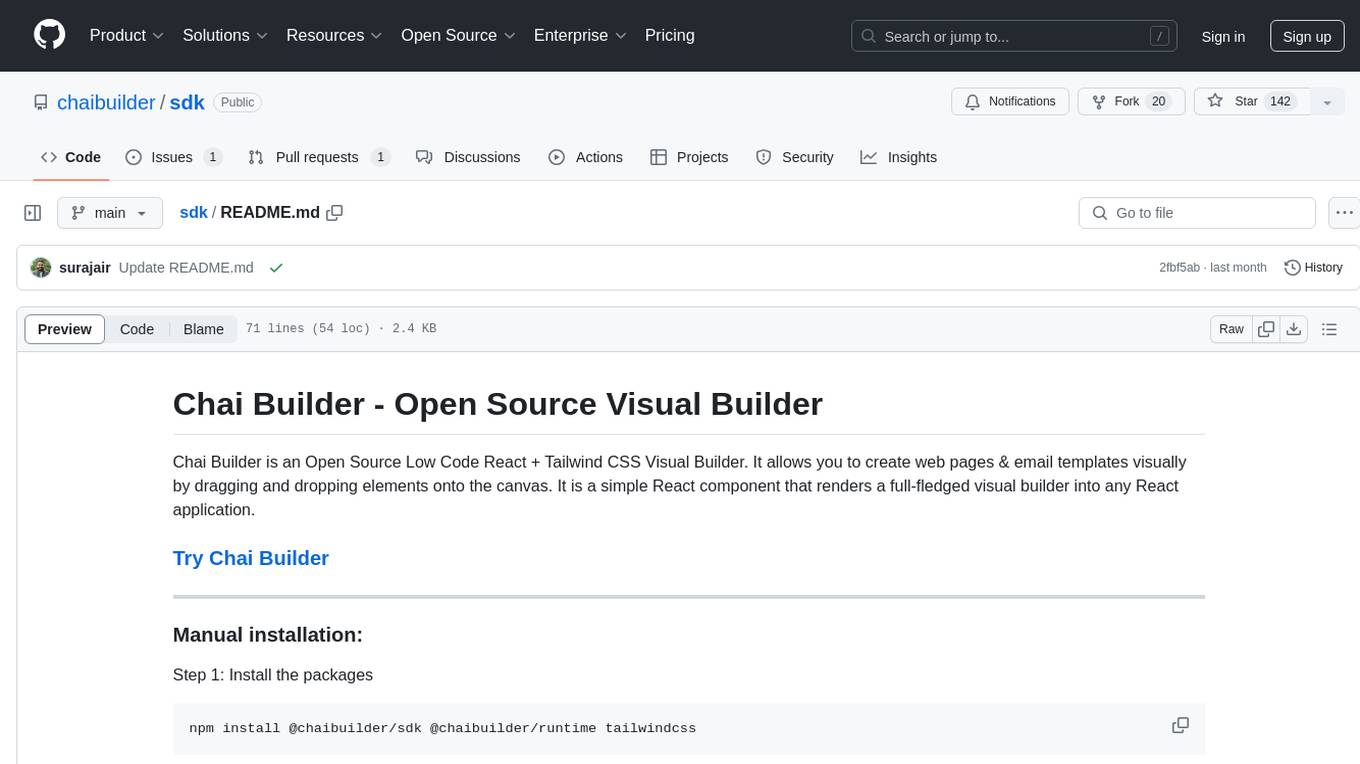
sdk
Chai Builder is an Open Source Low Code React + Tailwind CSS Visual Builder that enables users to create web pages & email templates visually by dragging and dropping elements onto the canvas. It is a simple React component that renders a full-fledged visual builder into any React application. Chai Builder aims to simplify the process of building web pages and email templates by providing a visual interface for developers and designers to work collaboratively.
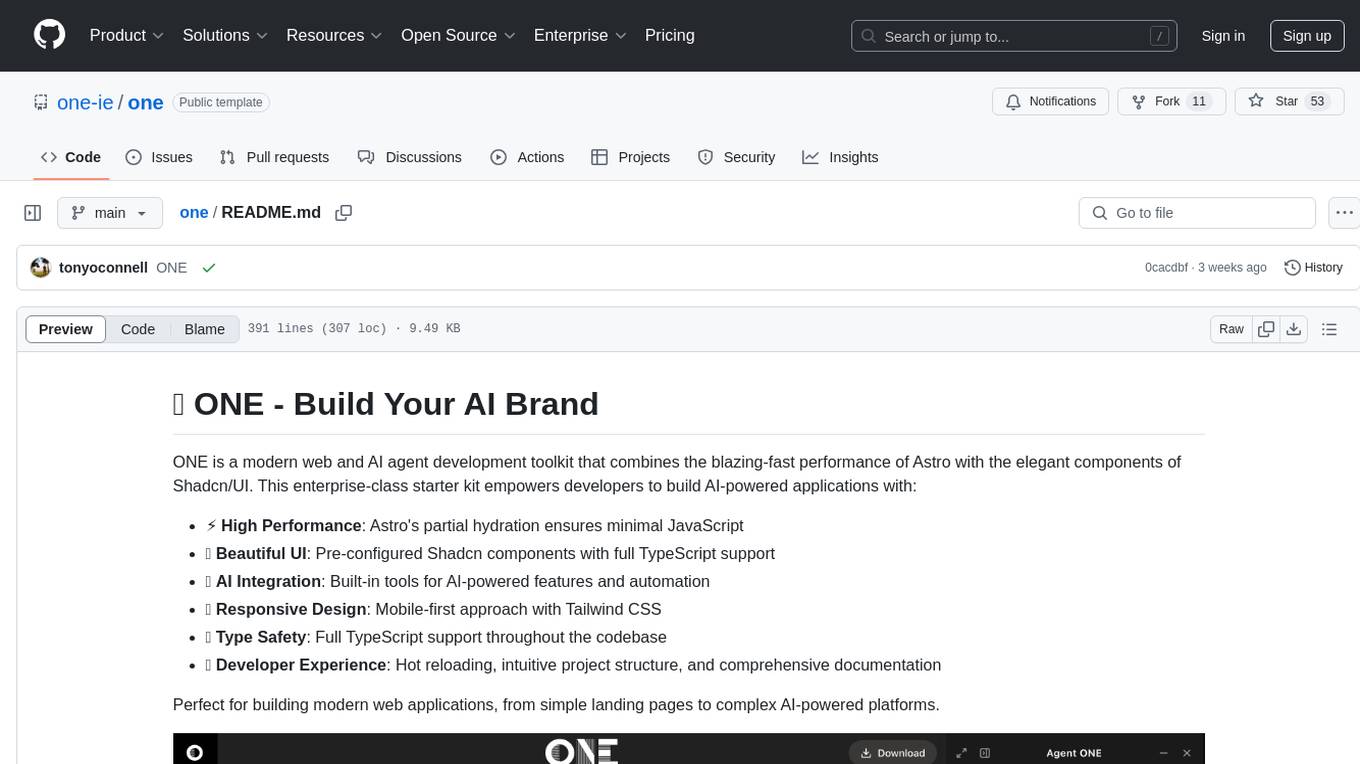
one
ONE is a modern web and AI agent development toolkit that empowers developers to build AI-powered applications with high performance, beautiful UI, AI integration, responsive design, type safety, and great developer experience. It is perfect for building modern web applications, from simple landing pages to complex AI-powered platforms.

airbnb-clone
This Airbnb clone project is a web application built with Next.js, TypeScript, Tailwind CSS, MongoDB, Prisma, Next auth, and Leaflet. It allows users to register, list and browse properties, make bookings and reservations, search and filter properties, and view property locations on an interactive map.
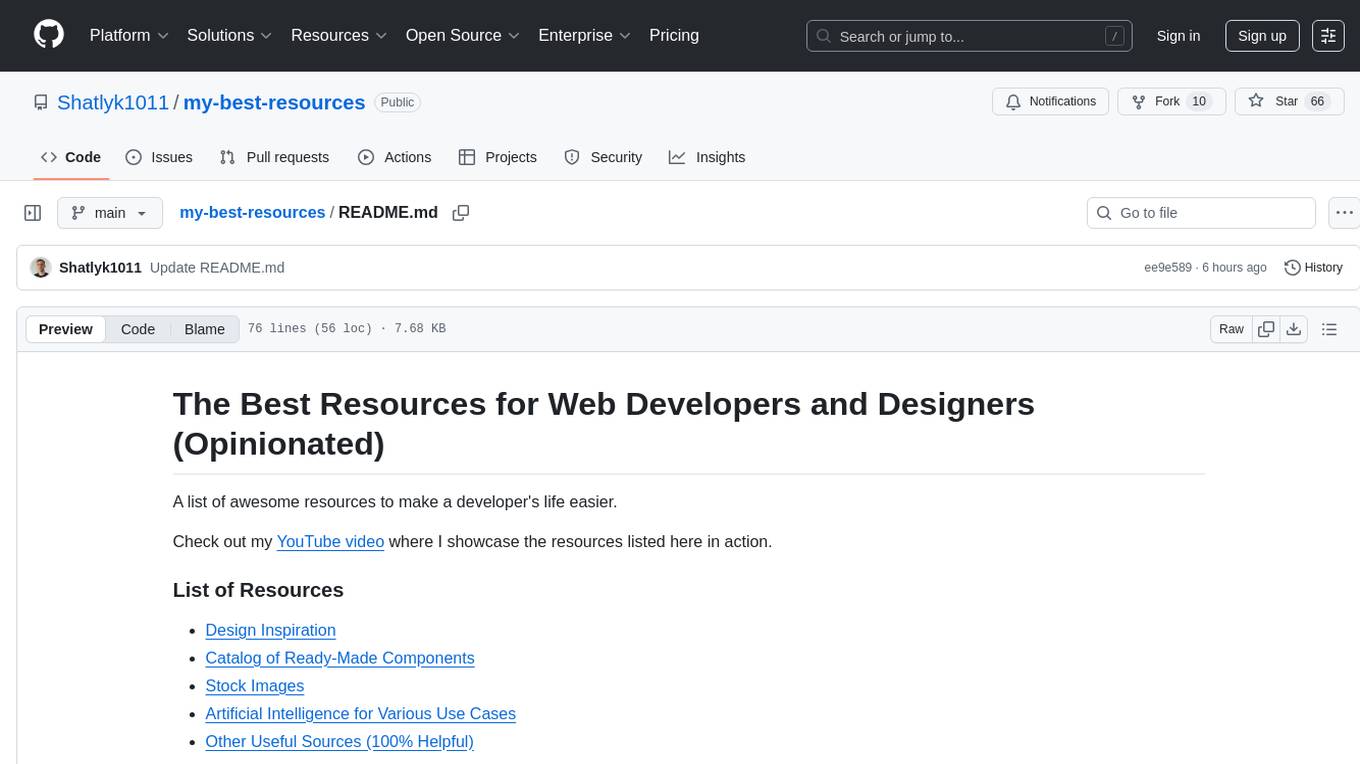
my-best-resources
my-best-resources is a curated list of resources for web developers and designers, aimed at making their lives easier. It includes sections on design inspiration, ready-made components, stock images, artificial intelligence tools for various use cases, and other useful sources. The repository provides links and descriptions for each resource, offering a valuable collection of tools and assets for web development and design projects.
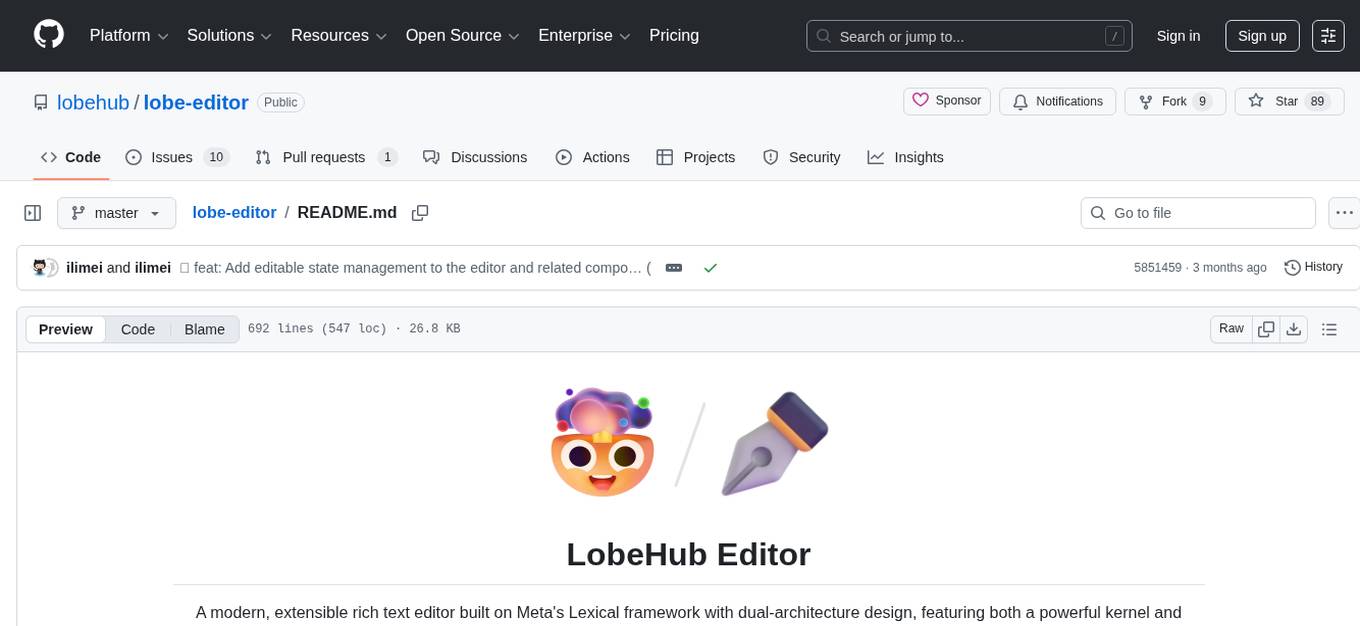
lobe-editor
LobeHub Editor is a modern, extensible rich text editor built on Meta's Lexical framework with dual-architecture design, featuring both a powerful kernel and React integration. Optimized for AI applications and chat interfaces, it offers a dual architecture with kernel-based API and React components, rich plugin ecosystem, chat interface ready, slash commands, multiple export formats, customizable UI, file & media support, TypeScript native, and modern build system. The editor provides features like dual architecture, React-first design, rich plugin ecosystem, chat interface readiness, slash commands, multiple export formats, customizable UI, file & media support, TypeScript native, and modern build system.